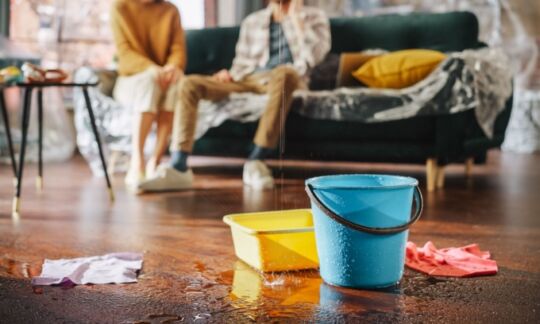10 common household emergencies
Is a blocked drain causing you stress? We share some examples of some of the most common household emergencies, and tips on how you can prepare.

Is a blocked drain causing you stress? We share some examples of some of the most common household emergencies, and tips on how you can prepare.
10 common home emergencies
Ten common home emergencies include:
- power blackout or power failure
- blocked toilet, pipe or drain
- broken or burst hot water system
- damaged roof, gutter, or downpipe
- being locked out of your home
- broken door or window
- gas leak
- water leak
- burst tap or shower head
- broken heating or air-conditioning system
These challenges are different to disasters such as theft, flood, or fire damage, but can still cause major disruptions to your life. They also affect thousands of people across Australia each year.
Compare Home & Contents Insurance
For more details about common home emergencies and some prevention tips, keep reading.
1. Power blackouts or power failures
The majority of power failures are caused by extreme weather, so there isn’t really much you can do to prevent this one from happening. In the event of a power failure be prepared, especially since you don’t really know how long you’ll be in the dark for.
12 blackout safety tips
Here are 12 blackout-related safety tips that could help you prepare before storms hit:
- Buy a generator if you can.
- Clean up hazards, such as outdoor furniture.
- Trim the branches and height of any trees that could fall on your power lines. If the roots of a potentially dangerous tree are in your neighbour’s yard, you may need to ask their permission before trimming it.
- Have a family emergency plan, which tells those in your house where things like the circuit breaker or manual release for the garage door are, so they can still get in and out if there’s no power.
- Ensure that you have all the necessary supplies on hand, ready to be used at a moment’s notice: things like torches, batteries, gas-powered cooking equipment and a radio.
- Stock bottled water, since your local water treatment facility could be affected and your taps may stop working as a result.
- Stock easy-to-heat food, such as canned food.
- Have cash on hand. Debit or credit cards may not work if power is out elsewhere.
- Unplug your computer so it doesn’t short out and fry the motherboard.
- Light candles where necessary (but be careful if you have young children and make sure you don’t leave any flames unattended), or have a few gas-powered lamps. Alternatively, you could also use battery-powered torches.
- Be wary of any perishables in the fridge or freezer and avoid opening either unless necessary. According to the Food Safety Information Council, food can remain safe in your refrigerator without power for two hours, and between one and two and a half days in the freezer if its door seals are in good condition. Food stored at more than 5°C for four hours or more should be thrown out.
- Check your home and contents insurance is enough to cover what your household might need.
Related Article: 6 ways to protect your car from hail and storm damage
2. Blocked toilet, pipe or drain
If your toilet and shower drains are blocked, it’s probably at least partly due to what you’re putting in there. Shower drains can get easily clogged with excess hair, which can be removed quickly and easily if you unscrew the drain cap or simply pull the hair out from the top of the drain. But you may want to wear some tough gloves for this task. If you can’t see the blockage, another idea is using a drain cleaner or even busting out a toilet plunger to remove deeper blocks.
Alternatively, pouring a mixture of hot water, baking soda and vinegar into a bathroom drain could break down solid matter over time. But be careful about the quantity because you don’t want to burst or rust the pipe. If that doesn’t work, it may be a good idea to call a licensed professional to come out and do it for you.
3. Broken or burst hot water system
We rely on hot water more than we realise – for things like showers, baths, making tea, and cleaning dishes. Australian Hot Water says you can expect an electric hot water system to last between 10 and 15 years on average, while a gas system will have a slightly shorter life expectancy at around eight to 12 years. A licensed installer can help you to replace a water heater if needed.
4. Damaged roof, gutter or downpipe
A damaged roof can be quite expensive, and generally speaking, should only be repaired by a licensed professional. On the other hand, if your gutter or downpipe is clogged, you might consider fixing it yourself if you can do so safely. Ensure you fully consider and understand the risks of working at heights first, and prioritise your personal safety. The Australian Competition and Consumer Commission (ACCC) has more information about some of the risks of working with ladders, for example, to consider.
Holes can form in gutters through rust, which can eat through steel over time and cause water and grime to fall out into your yard. If you feel up to the task, you could try fixing it yourself. You’re likely to find the tools and materials (such as roofing cement) you need at your local hardware store.
5. Getting locked out of home
Having a spare key in a secure location may help you avoid getting locked out. Perhaps leave a key with a trusted friend or relative, or in an electrical panel protected by a combination lock. Places you might like to avoid leaving a spare key include under your doormat, in a pot plant, or on a window ledge.
You should also be very cautious and careful about leaving windows open, as this might increase the likelihood of being robbed and will most likely void your insurance claim should this occur.
Compare Home and Contents Insurance with Canstar
If you’re comparing home and contents insurance policies, the comparison table below displays some of the policies currently available on Canstar’s database for an Australian aged under 50, seeking cover in NSW or the ACT for a cost to replace contents of below $75,000. Please note the table is sorted by Star Rating (highest to lowest), followed by provider name (alphabetical) and features links direct to the providers’ websites. Consider the Product Disclosure Statement (PDS) and Target Market Determination (TMD), before making a purchase decision. Contact the product issuer directly for a copy of the PDS and TMD. Use Canstar’s home insurance comparison selector to view a wider range of policies. Canstar may earn a fee for referrals.
 24/7 claims
24/7 claims
 New for old
New for old
 24/7 claims
24/7 claims
 Online discount
Online discount
 New for old
New for old
Products displayed above that are not “Sponsored or Promoted” are sorted by Star Rating and then alphabetically by company. Canstar may receive a fee for referral of leads from these products. See How We Get Paid for further information. If you decide to apply for Home Insurance or Contents Insurance, you will deal directly with an insurance provider, and not with Canstar.
Consider the provider’s detailed product and pricing information before making a decision to purchase a policy. The products displayed on this page do not include all providers and may not compare all features relevant to you. View the Home Insurance Methodology and Report. The Star Rating shown is only one factor to take into account when considering products.
6. Broken heating or air-conditioning system
According to energy retailer Energy Australia, there are five common signs that could mean your heating or cooling unit needs to be fixed or replaced:
- the unit is running, but no or very little warm or cool air is coming out
- your energy bills are higher than usual, which could indicate your unit is not working as efficiently as it could
- there are “strange emissions” coming out of the unit, such as odd smells, extra-loud sounds or water dripping from the unit inside the house
- the temperature is inconsistent in different parts of your house
- the device needs repairs multiple times per year.
If any of these issues are affecting your air conditioner or heater, it could be wise to call a professional so that it can be examined and potentially removed or replaced.
7. Broken door or window
If you have a broken door or window at home, a possible security risk that should be fixed immediately to prevent thieves getting into your home when you’re not there.
You can find out more about the costs of replacing a broken window with Canstar.
8. Gas leak
Gas leaks can be quite dangerous. A flame or even a spark in an enclosed area full of gas can cause a fire or even an explosion. WA-based gas supplier Kleenheat advises that natural gas has a distinctive odorant added, meaning that a gas leak would give off a ‘rotten egg’ smell. So if you smell this or suspect there is a gas leak in your home, Australian Gas Networks suggests to:
- not smoke or light any matches or naked flames
- not turn anything electrical on or off, including flashlights, as this could cause a spark that starts a gas fire
- open all the doors and windows to air out the room
- turn off the gas supply at the meter
- contact a licensed gas fitter to repair the leak and ensure your house is fit to be inhabited again
The owner of a property is responsible for installing the gas and making sure it is maintained correctly and safely. Remember that a gas leak can also be dangerous to the people around you, so it is imperative that you follow these steps above to stay safe.
9. Water leak
Water leakages can cost hundreds of dollars to fix, and if you don’t get them fixed right away, they can cause thousands of dollars in structural damage long-term, so responding quickly is important.
According to Queensland Urban Utilities, signs that you could have a water leak on your property include:
- dripping taps
- water pooling under your dishwasher, fridge, washing machine or laundry tub
- warped or discoloured cupboards, bench tops, floorboards or walls
- a toilet cistern that is constantly running
- wet or bright green patches of grass in your yard
- water leaking from your water meter
A replacement tap can cost you anywhere from around $50 up to a few hundred dollars, according to hipages. More often than not, you’ll need to hire a plumber before too long if you have a water leak. Some steps you might consider taking as temporary fixes include:
- shutting off the water valve on that pipe (this may be under the sink)
- wiping the pipe dry with a cloth and using a pipe repair kit over the hole
- using a pipe clamp or clip to block the leak temporarily
- using a rubber sheet and covering with water-resistant tape to the hole and turning the tap back on to make sure there is still no leak
A dripping tap may just mean a washer needs replacing, but if there is a significant leak, then you may have to buy a new pipe. Unless you know how to do plumbing yourself, it is typically a good idea to hire an experienced plumber to do it for you.
10. Burst tap or showerhead
Burst taps and showerheads generally need to be replaced relatively quickly to avoid significant damage. If there’s a lot of water coming out of the tap or showerhead, turn all faucets off and consider shutting off the water to your building, if this is an option. If you are in a unit block and you aren’t sure where or how to turn off the water switch for your whole building, phone your body corporate manager, building manager, or landlord for their advice.
Showerheads can be relatively straightforward to replace if you know what you’re doing, provided you have a new showerhead, an adjustable wrench and some plumber’s tape. Once you’ve settled on your new showerhead you’ll have to remove the old one, as well as any excess materials like old rubber gaskets. Wrap the threads of the pipe with a few layers of Teflon tape to make it a bit stickier and then screw in the new showerhead.
Installing a new tap is a bit harder, but not impossible. There are some comprehensive tutorial videos available on YouTube for all kinds of tap replacement situations if you want to give it a go yourself.
But in many cases it may be preferable to hire a licensed plumber to do the work instead. This can reduce the risk of something going wrong and of a home insurance claim being denied due to unlicensed repair work.
 24/7 claims
24/7 claims
 Online discount
Online discount
 New for old
New for old
 24/7 claims
24/7 claims
 New for old
New for old
 24/7 claims
24/7 claims
 Online discount
Online discount
 New for old
New for old
 24/7 claims
24/7 claims
 New for old
New for old
 24/7 claims
24/7 claims
 Online discount
Online discount
 New for old
New for old
Canstar may earn a fee for referrals from its website tables, and from Sponsorship or Promotion of certain products. Fees payable by product providers for referrals and Sponsorship or Promotion may vary between providers, website position, and revenue model. Sponsorship or Promotion fees may be higher than referral fees. Sponsored or Promotion products are clearly disclosed as such on website pages. They may appear in a number of areas of the website such as in comparison tables, on hub pages and in articles. Sponsored or Promotion products may be displayed in a fixed position in a table, regardless of the product’s rating, price or other attributes. The table position of a Sponsored or Promoted product does not indicate any ranking or rating by Canstar. For more information please see How We Get Paid.
This is an update of an article originally written by William Jolly.
Cover image source: Gorodenkoff/Shutterstock.com
Thanks for visiting Canstar, Australia’s biggest financial comparison site*
This article was reviewed by our Editor-in-Chief Nina Rinella before it was updated, as part of our fact-checking process.

- 10 common home emergencies
- 1. Power blackouts or power failures
- 2. Blocked toilet, pipe or drain
- 3. Broken or burst hot water system
- 4. Damaged roof, gutter or downpipe
- 5. Getting locked out of home
- 6. Broken heating or air-conditioning system
- 7. Broken door or window
- 8. Gas leak
- 9. Water leak
- 10. Burst tap or showerhead
 24/7 claims
24/7 claims
 Online discount
Online discount
 New for old
New for old
Try our Home Insurance comparison tool to instantly compare Canstar expert rated options.






